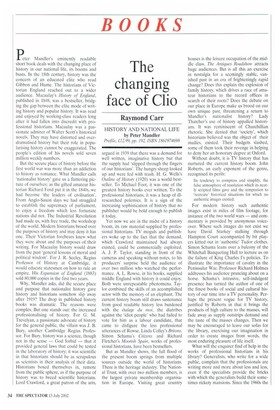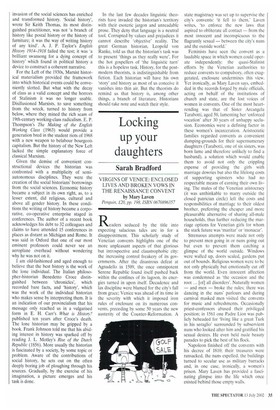The changing face of Clio
Raymond Carr
HISTORY AND NATIONAL LIFE by Peter Mandler
Profile, 112.99, pp. 192, ISBN 1861974698
Peter Mandler's eminently readable short book deals with the changing place of history in our national life, its booms and busts. In the 18th century, history was the concern of an educated elite who read Gibbon and Hume. The historians of Victorian England reached out to a wider audience. Macaulay's History of England, published in 1848, was a bestseller, bridging the gap between the elite mode of writing history and popular history. It was read and enjoyed by working-class readers long after it had fallen into discredit with professional historians. Macaulay was a passionate admirer of Walter Scott's historical novels. They may have distorted and overdramatised history but their role in popularising history cannot be exaggerated. The people's edition of his novels sold seven million weekly numbers.
But the secure place of history before the first world war was more than an addiction to history as romance. What Mandler calls 'nationalist history' gave us a flattering picture of ourselves; as the gifted amateur historian Richard Ford put it in the 1840s, we had become 'the leaders of civilisation'. From Anglo-Saxon days we had struggled to establish the supremacy of parliament, to enjoy a freedom which less fortunate nations did not. The Industrial Revolution had made us, with free trade, the workshop of the world, Modern historians brood over the purposes of history and may deny it has one. Their Victorian forebears knew what they were about and the purposes of their writing. For Macaulay history would draw from the past 'general lessons of moral and political wisdom'. For J. R. Seeley, Regius Professor of History at Cambridge, it would educate statesmen on how to rule an empire. His Expansion of England (1883) sold 80,000 copies in the first two years.
Why, Mandler asks, did the secure place and purpose that nationalist history gave history and historians somehow slip away after 1919? The drop in published history books was dramatic. The reasons were complex. But one stands out: the increased professionalising of history. For G. M. Trevelyan, a passionate advocate of history for the general public, the villain was J. B. Bury, another Cambridge Regius Professor. For Bury, history was a science, though not in the sense God forbid — that it provided general laws that could be tested in the laboratory of history; it was scientific in that historians should be as scrupulous as scientists in their analysis of their data. Historians boxed themselves in, remote from the public sphere, as if the purpose of history was to breed scientific historians. Lord Crawford, a great patron of the arts,
argued in 1939 that there was a demand for well written, imaginative history but that the supply had 'slipped through the fingers of our historians'. The hungry sheep looked up and were fed with trash. H. G. Wells's Outline of History (1920) was a world bestseller. To Michael Foot, it was one of the greatest history books ever written. To the professional historians, it was a heap of illresearched polemics. It is a sign of the increasing sophistication of history that no publisher would be bold enough to publish it today.
Yet now we are in the midst of a history boom, its raw material supplied by professional historians. TV moguls and publishers woke up to the fact that the demand, which Crawford maintained had always existed, could be commercially exploited. A. J. P. Taylor, standing in front of the cameras and speaking without notes, to his producers' surprise held the audience of over two million who watched the performance. A. L. Rowse, in his books, supplied middle England with history it could enjoy. Both were unrepeatable phenomena. Taylor combined the skills of an accomplished actor with the memory of an elephant. The current history boom still draws sustenance from good readable history less burdened with the etalage du tnoi, the diatribes against the 'idiot people' who had failed to vote for him as a labour candidate, that came to disfigure the less professional utterances of Rowse. Linda Colley's Britons, Simon Schama's Citizens and Richard Fletcher's Moorish Spain, works of professional historians, have been bestsellers.
But as Mandler shows, the full flood of the present boom springs from multiple sources outside the world of historians. There is the heritage industry. The National Trust, with over two million members, is the largest private membership organisation in Europe. Visiting great country houses is the leisure occupation of the middle class. The Antiques Roadshow attracts huge audiences. But is all this an exercise in nostalgia for a seemingly stable, vanished past in an era of frighteningly rapid change? Does this explain the explosion of family history, which drives a race of amateur historians to the record offices in search of their roots? Does the debate on our place in Europe make us brood on our own unique past, threatening a return to Mandler's nationalist history? Lady Thatcher's use of history appalled historians. It was reminiscent of Churchillian rhetoric. She denied that 'society', which historians believed was the object of their studies. existed. Their budgets slashed, some of them took their revenge in helping to deny her an honorary degree at Oxford.
Without doubt, it is TV history that has nurtured the current history boom. John Roberts, an early exponent of the genre, recognised its perils:
Its tendency to compress and simplify, the false atmosphere of resolution which its neatly scripted films gave and the temptation to 'recreate' historical situations for which no authentic images existed.
For modern history such authentic images exist in miles of film footage, for instance of the two world wars — and commentary is provided by anonymous voiceover. Where such images do not exist we have David Starkey stalking through Hampton Court accompanied by bit players kitted out in 'authentic' Tudor clothes. Simon Schama leans over a balcony of the Whitehall Banqueting Hall to lecture us on the failure of King Charles I's policies. To illustrate the importance of cavalry in the Peninsular War, Professor Richard Holmes addresses his audience prancing about on a horse. Schama's intrusive, self-indulgent presence has turned the author of one of the finest books of social and cultural history of our time into a TV personality. Perhaps the present vogue for TV history, justified by Roberts in that it brings the products of high culture to the masses, will fade away as supply outstrips demand and the taste of the masses changes. Then we may be encouraged to leave our sofas for the library, exercising our imagination in order to create images from words, the most enduring pleasure of life itself.
What will the enquirer find of help in the works of professional historians in his library? Generalists, who write for a wide public, complain that the professionals are writing more and more about less and less, even if the specialists provide the bricks with which the generalists build their sometimes rickety mansions. Since the 1960s the
invasion of the social sciences has enriched and transformed history. 'Social history', wrote Sir Keith Thomas, its most distinguished practitioner, was not 'a branch of history like postal history or the history of furniture; it was the way of writing history of any kind'. A. J. P. Taylor's English History 1914-1918 failed the test; it was 'a brilliant swansong for a dying concept of history' which found in political history a device to construct a coherent narrative.
For the Left of the 1930s, Marxist historical materialism provided the framework into which historical events could be conveniently slotted. But what with the decay of class as a valid concept and the horrors of Stalinism it was no longer usable. Disillusioned Marxists, to save something from the wreck, turned to history from below, where they mined the rich seam of 19th-century working-class radicalism. E. P. Thompson's The Making of the English Working Class (1963) would provide a generation bred in the student riots of 1968 with a new weapon to belabour bourgeois capitalism. But the history of the New Left lacked the simple explanatory force of classical Marxism.
Given the demise of convenient constructional devices the historian was confronted with a multiplicity of semiautonomous disciplines. They were the creation of the social historians' borrowings from the social sciences. Economic history became a subject in its own right, as, to a lesser extent, did religious, cultural and above all gender history. In these conditions the writing of history became a corporative, co-operative enterprise staged in conferences. The author of a recent book acknowledges his debt to 32 colleagues and claims to have attended 15 conferences in places as distant as Michigan and Rome. It was said in Oxford that one of our most eminent professors could never see an aeroplane overhead without wondering why he was not on it.
I am old-fashioned and aged enough to believe that the best history is the work of the lone individual. The Italian philosopher-historian Benedetto Croce distinguished between 'chronicles', which recorded bare facts, and 'history', which was the work of the individual historian who makes sense by interpreting them. It is an indication of our provincialism that his message only reached us in a vulgarised form in E. H. Carr's What is History? published ten years after Croce's death. The lone historian may be gripped by a book. Frank Johnson told me that his abiding interest in history was sparked off by reading J. L. Motley's Rise of the Dutch Republic (1856). More usually the historian is fascinated by a society, by some topic or problem. Aware of the contributions of social history, he sets out on the often deeply boring job of ploughing through his sources. Gradually, by the exercise of his imagination, a picture emerges and his task is done.
In the last few decades linguistic theorists have invaded the historian's territory with their esoteric jargon and unreadable prose. They deny that language is a neutral tool. Corrupted by values and prejudices it cannot describe `objective' reality. The great German historian, Leopold von Ranke, told us that the historian's task was to present `things as they really were'. For the hot gospellers of 'the linguistic turn' this is a hopeless task. History, for the postmodern theorists, is indistinguishable from fiction. Each historian will have his own 'story' and history as most of us conceive it vanishes into thin air. But the theorists do remind us that history is, among other things, a branch of literature. Historians should take note and watch their style.



































































 Previous page
Previous page